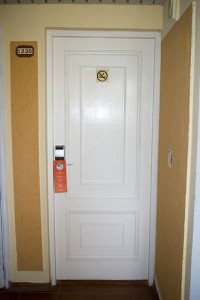Cities and states from California to Maine have confronted the problem of hotels that are crime magnets.  One solution that some evidence suggests effectively deters crime is ordinances or state laws that require hotels to keep detailed information about guests that are subject to police inspection. These ordinances and laws generally do not require police to obtain a warrant.
One solution that some evidence suggests effectively deters crime is ordinances or state laws that require hotels to keep detailed information about guests that are subject to police inspection. These ordinances and laws generally do not require police to obtain a warrant.
In Los Angeles v. Patel a Los Angeles ordinance requires hotel and motel operators to keep specific information about their guests and allows police to inspect the registries without warrants. Motel operators claim this ordinance is facially invalid under the Fourth Amendment.
The first issue the Supreme Court will decide in this case is whether facial challenges to ordinances and statutes are permitted under the Fourth Amendment. A facial challenge to the ordinance in this case (as opposed to an as-applied challenge where the court would decide whether a particular search under the ordinance violates the Fourth Amendment) requires a court to determine whether all searches that might be conducted pursuant to the ordinance are unconstitutional. The Ninth Circuit majority opinion did not discuss the possibility that Fourth Amendment facial challenges to ordinances and statutes are impermissible.
The second issue in this case is whether a hotel has an expectation of privacy under the Fourth Amendment in a hotel guest registry where the guest-supplied information is mandated by law and an ordinance authorizes the police to inspect the registry. The third issue is if so, whether the ordinance is facially unconstitutional unless it expressly provides for pre-compliance judicial review before the police can inspect the registry.
The Ninth Circuit majority first concluded that the motel owners have property and privacy interests in their records and that they are not required to prove, as a factual matter, that their records are subject to a reasonable expectation of privacy. A dissenting opinion asserted there is “nothing to support the factual proposition that hotels generally treat [their guest registries] as private.”
The majority then concluded that the ordinance is facially unconstitutional because it fails to expressly provide for pre-compliance judicial review before the police can inspect the registry. “The Supreme Court has made clear that, to be reasonable, an administrative record-inspection scheme need not require issuance of a search warrant, but it must at a minimum afford an opportunity for pre-compliance judicial review, an element that [the ordinance] lacks.”
This case is important to state and local governments for a number of reasons. First, hotel registry ordinances and statutes are common. In its petition for certiorari Los Angeles cites to 70 “representative” hotel registry ordinances from big cities to small towns and two state statutes (Maine and Massachusetts). Second, evidence indicates these ordinances are effective at deterring crime. In Los Angeles’s reply brief it pointed out that it sampled five motels during a six-month period when the ordinance wasn’t enforced and crime had gone up 82 percent. Finally, other state laws and ordinances require businesses such as pawn shops and scrap metal dealers to keep data subject to police inspection. These laws, and any other laws raising Fourth Amendment concerns, may be subject to as-applied challenges unless the Supreme Court rules to the contrary.
The State and Local Legal Center will file an amicus brief in this case.
(Photo courtesy of Flickr by Christopher Lancaster, creative-commons license, no changes made).
